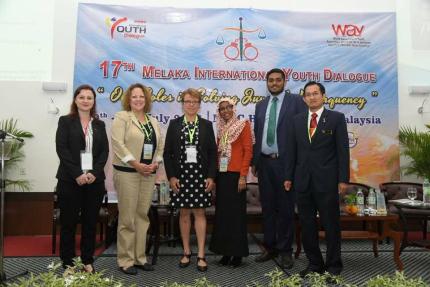Understanding and Impacting Juvenile Justice Internationally
Juvenile Justice was the focus on the international stage at the 17th Annual Melaka International Youth Dialogue Conference in Maleka, Malaysia July 10-13th, 2017. Monica Miles-Steffens, Director of Placement, Juvenile Division of the Administrative Office of the Courts and Probation and Dr. Anne Hobbs, Director of the Juvenile Justice Institute, University of Nebraska at Omaha shared the stage as plenary speakers to an audience representing over 40 different countries. The conference is sponsored by the World Assembly of Youth (WAY) which is an international coordinating body of national youth councils and organizations, representing 140 member organization from all continents. Founded in 1949, WAY has general consultative status with the Economic and Social Council of the United Nations and works for the promotion of youth and youth organizations in program areas such as: youth employment, environment, human rights, democracy, population, health, drugs, community development, leadership training and now juvenile justice.
Through their presentations were able to inform young adults and professionals from around the world on the juvenile justice best practices being implemented in the United States and specifically Nebraska. Dr. Hobbs spoke to diversion programs and how they provide better outcomes for lower risk youth. Ms. Miles-Steffens spoke to evidence based practices used in juvenile probation such as the use of validated risk assessment, motivational interviewing and targeted interventions that are designed to reduce recidivism and address the risk and needs of youth. The second day of the work shop, they assisted in facilitating small group work sessions where participants worked through discussion questions leading them to make global recommendations for addressing juvenile justice practice. It was clear through these sessions that the issues facing youth and families transcends across all borders. Poverty, access to education and meaningful employment, disengaged families, substance use and mental health issues were prevalent no matter what country was speaking. It was also exciting to learn that other countries have also implemented similar evidence based practices. For example, Singapore has implemented the Youth Level of Service Case Management Inventory (YLS/CMI)-the same tool used by Nebraska Probation and many others across the United States and Canada. In addition, Singapore has a strong emphasis on restorative practices, are developing new standards of competency and training for youth workers and are partnering with the University to create a new youth work emphasis in their social work program.
But for all the similarities, there were stark differences in law and policy. For example, in Malaysia there has been a separate system for juveniles since 1947 however, diversion opportunities are rare and the system heavily relies on punitive and institutional practices. One speaker from Maleka shared that the country has over 2000 youth in institutions. Malaysia is also a predominately Muslim country and recognizes the Sharia law and practices in family court. China has no separate juvenile code. There are pieces of law that protect juveniles in some circumstances, but they are currently working to establish a separate juvenile code. Some countries identified no minimum age threshold for criminal responsibility while others were very low such as 6 and 7 years of age. In talking with participants from African countries, there was a theme of corruption among police and court officials where the ability to pay bribes often impacted the outcome of cases. While the United States still has work to do as we incarcerate youth and adults at rates higher than any other country, we can be confident in our legal system and the protections it provides for youth and families.
The discussions in the workshops culminated in a final document of recommendations on juvenile justice next steps for member countries of the United Nations. These recommendations were divided into categories including: Public Sector, Private Sector, Non-Government organizations, Media, and Youth. The national youth councils present at the conference are able to return to their countries armed with new information and strategies for impacting policy and practice change and their recommendations help inform United Nations policy. It was a privilege to represent the Administrative Office of the Courts and Probation in this international venue and energizing to participate alongside young people and professionals from across the world who are passionate about improving opportunities for youth in trouble.
Photo: Session One Plenary Speakers at 17th Annual Melaka International Youth Dialogue From Left to Right: Ms. Ediola Pashollari, Secretary General of World Assembly of Youth; Monica Miles-Steffens, Director of Placement, Juvenile Division Administrative Office of Courts and Probation; Dr. Anne Hobbs, Director Juvenile Justice Institute, University of NE at Omaha; Ms. Duha Abuobiada Abdalla Mahgoub, Research and Education, Country of Sudan; Mr. Kishva Ambigapathy, Maleka Commonwealth Youth Council; Mr. Muhammad Amir Haron, Director of Policy and Research, Prime Minister's Office, Malaysia.

